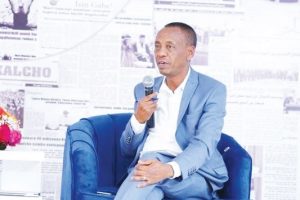
BY ABEBE WOLDEGIORGIS
Countries particularly in Africa and other parts used transitional justice to redress grievance created due to violation of human rights, extra judicial killings, genocide, rapes, political repression civil war and conflict. Such measures enabled the countries not only to bring relief to the victims of the past atrocities and bring the culprits to justice but also to create a forward looking society.
The measures utilizes various tools and among other to bring justice to the culprits through legal system, giving amnesty to the criminals through reconciliation, pardoning the culprits by the victims and conducting national dialogue. Transitional justice practiced in South Africa and Ruanda based on the reality on the ground and their historical and cultural situations.
During the apartheid era, the oppressed mass including black Africans and others through their vanguard leadership of the African National Congress and other civic associations waged struggled against the apartheid system to gain their independence. During the struggle, many arrested, extra judicially killed, abducted to no their ware about and torched. The apartheid system, characterized by racial discrimination among whites, colures, Asians and blacks reigned for four decades was abolished in 1992. And the new government led by ANC introduced transitional justice in order to heal the past grievance and to move the country forward.
Hence, the new government established peace and reconciliation commission led by the late archbishop Dismount Tutu and made opened discussion between the aggrieved and the responsible officials who committed crime against humanity and reached to give amnesty to some of the culprits. Others faced justice through judiciary system by establishing tribunal court. The outcome brought political stability to that country and to create the culture of political tolerance and forward looking community.
In 1994 human carnage occurred in Ruanda which cost 800 000 people life in only three months, that country which ever had experience. The extremists of the Hutu ethnic groups committed such crime on their brothers belongs to the Tutsi ethnic group who speak the same language. After assuming power the Rwandan Patriotic front led by the current president Paul Kagame, to change the politics of hatred towards love and peace perused the reconciliation and stabilization policy.
The mechanism utilized to alleviate the trauma felt by the parents of the victims enabled to attain peace and to put the criminals to justice. In the imperial era, attempts were made to bring transitional justice by the court system to resolve problems through peaceful means by interrogating the government officials who were suspected of corruption and abusing of power to amass wealth through looting the government treasury.
To mitigate the problem, the emperor announced that he established the investigative commission to deal with the officials who were responsible in abusing power for their personal gain and exploiting their tenants. The members of the investigative commission including the late professor Mensfin Woldemariam and Dr Bereket Habtesilase now in exile had begun their work thoroughly.
The objective of the establishment of the commission was to make trial on the suspected and put them in to accountable. Their cause was also handled by the court. In 1974 when the imperial old establishment was shocked by popular revolution and months later, the old system met its death. The newly established Dergue regime which overthrew the old establishment ordered the investigative commission to abandon its task.
Later on, the regime sentenced 60 of the imperial regime officials to death without due process of law. Such measure shocked the world and derailed the Ethiopian revolution started in peaceful manner through dis obedience and demonstration and indulged the country in civil war. The reign of the Dergue which lasted for 17 years characterized by civil war, extrajudicial killing, arbitrary arrest and zero tolerance of decedent ideas, ended in 1991. TPLF led the Ethiopian People’s Revolutionary Democratic Front which assumed power did not show to conduct peace and reconciliation among various citizens.
Currently in our country, the political discourse is governed by the narratives of oppression and oppressed along ethnic lines. Some feck rhetoric also used to blame some ethnic groups. Extreme political activities abuse the past misdeeds by using it as inputs for running their political agendas and to rally their supporters behind them. In fact, there is an undeniable fact that, in the past, ill treatment of social groups and violation of human rights were committed by governors and none state actors.
Some argue that ethnic based territory enshrined in the constitution and ethicized media functioning locally and outside orchestrate political polarization and made the path to dialogue very hard.
Culturally, each ethnic group and urban residents have the culture of resolving difference and conflicts among groups and individuals through negotiation monitor by elders. Such approaches enabled the community to live peacefully in a tolerance manner for long. However, the advent of modernization and court system eroded the role of the traditional council of elders in bringing justice through reconciliation.
Back to 1991, after assuming of power the EPRDF government did not open the door for dialogue and reconciliation to relieve the past grievance committed by the previous government and to bring justice to the culprits. As the winner of the war and assumed power by gun, imposed its own justice system by arresting the officials of the Dergue unwarrantedly. That time, civil society associations from the various corners forwarded questions to the regime to conduct reconciliation among various groups to bring justice to the criminals committed against the innocent people. But the new government adamantly rejected and imposed its own interest.
It claimed that as if it brought justice to the victims of red terror parents. But it denied justice to the mother and fathers whose children had been killed by white terror committed by the opposition parties who wage war against the Dergue regime. Some critically argue that the building constructed for the commemoration of red terror victims located near meskel square does not symbolize justice. Because, arbitrary arrest and extrajudicial killings had not been halted.
Many Dergue officials mate their death in the custody and others left the prison after they served more than 20 years. These all indicate that how the nation missed opportunities to bring justice through reconciliation and giving amnesty.
The reformist government led by Abiy Ahmed since it assumed power in 2018 showed its willingness to bring justice through pardon and amnesty by conducting national reconciliation. The Prime Minister himself when he made oath in front of the parliament, he officially request pardon the public to the past grievance and atrocities committed by the EPRDF regime since it was in power.
Recently the Minister of Justice Gedeon Themoteos (PHD) announced that the transitional justice will be served and to that end the independent organ will be organized. The transitional justice that is going to be conducted in Ethiopia is part of the Pretoria peace agreement reached between the government and the TPLF officials. The international organizations among others, the African Union, the United Nations, European Union and the United States announced that, they will support the peace accord and the implementation of transitional justice. To that end, the US pledged to provide financial support to the process and to build capacity to meet the goal.
The peace accord emphasizes the recognition of the constitution and stipulates that, every issue regarding the implementation of the Pretoria accord to be conducted with no antagonizing the constitution.
As it is remembered, the two years long war which had been waged between the government and the TPLF fighters forced civilians to be displaced from their areas and about a million combatant and none combatants were lost their life. Infrastructure is demolished, abduction and rapping of women were committed and the survivors are still suffering from psychological trauma.
Hence, bringing the culprits to justice through court system, reconciliation to see bright future by leaving the trauma to the past, pardoning and amnesty are essential. Currently the victims of the war are living in the appalling situation in camps and the culprits also are not face justice till now.
However, the time bounding of the transitional justice task is not limited to the two years long war took place in the northern part of the country. According to sources, the time comprised since the down fall of the Dergue regime and deal the issues on crime committed against humanity and war crimes.
The professional groups appointed by the government for this purpose made press conference with media. As it is known, previously the National Consultation Commission is established and currently to start its work, it collected agendas from the public starting from the grass root level and soon it will begin open discussion with selected members of the society. The National Consultation Commission and the Transitional Justice have different tasks and mandate but one can support the other. For example, the when consensus is reached between discussants conducted by National Consultation Committee, the resolutions can serve as input for the Transitional Justice Commission.
But some argue that, the existing legal and judiciary system should not deserve to conduct transitional justice because it was controlled and manipulated by the past executive branch of the government which took responsibility for the atrocities committed in the past. Hence they say establishing new court to deal the matter should be taken as a way out. Others also dis agree with the mentioned idea and establishing special court for bringing transitional justice is expensive beyond the nation financial capacity. Any ways to heal the past grievance and to compensate the victims of atrocities conducting the transitional justice by whatever means is essential and hope will bring political stability.
Editor’s Note: The views entertained in this article do not necessarily reflect the stance of The Ethiopian Herald
The Ethiopian Herald March 26/2023




